

Rob-n-Hild, oot and aboot eh? Sorry - 2022
|
Click links to jump to specific days: Start | Nerdy | The Largest... | Ornaments
|
|||||||||||||||||||||||||||||||||||||||||||||||||||||||||||||||
|
Maple Creek - Grasslands National park (467 km in 5 hours and 59 minutes. Max elevation 1,007) 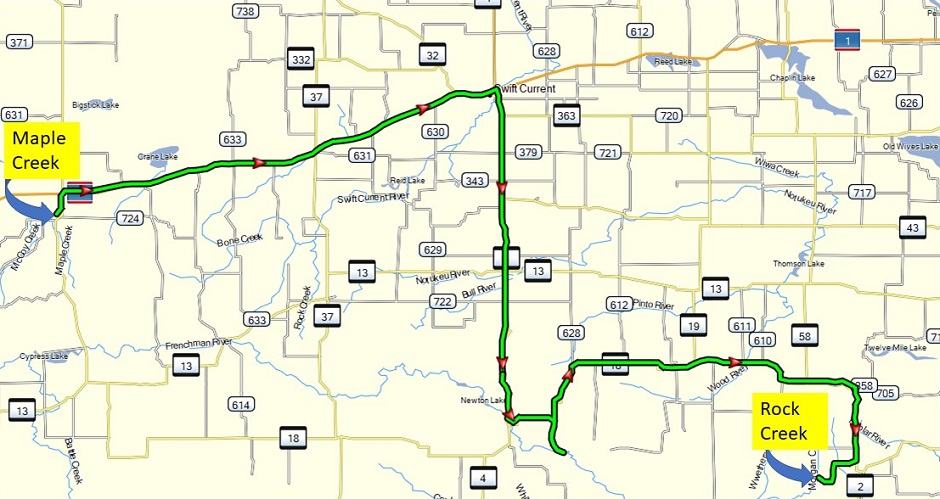
|
|||||||||||||||||||||||||||||||||||||||||||||||||||||||||||||||
| With good roads from Maple Creek and Swift Current, we got to the Grasslands National Park visitor center by 11 am - which gave us time to take the drive through the West Block, before the long drive round to the East Block where we are staying. This drive (on more gravel roads!) has a number of stops with signs pointing out the interesting features of the prairie - from the vegetation, to the animals and the cultural history! Bison were the original inhabitants, followed by nomadic tribes who lived off the bison. Then, when the skins became valuable traded commodities, the hunting became very extensive and as the bison died out, they were replaced by cattle ranching. That was replaced in turn by homesteads as policy changed to encourage people to farm the land, which tuned out to be pretty rough so most of the prairies here are back to cattle ranching with the area of the national park being re-populated with bison. | |||||||||||||||||||||||||||||||||||||||||||||||||||||||||||||||

|
|||||||||||||||||||||||||||||||||||||||||||||||||||||||||||||||
| After the long drive we started off by enjoing lunch at a picnic spot. The usual deal with sandwiches, milk and tea. Below Rob illustrates the "flame on" lighter, and the "flame off" home-made extinguisher. | |||||||||||||||||||||||||||||||||||||||||||||||||||||||||||||||
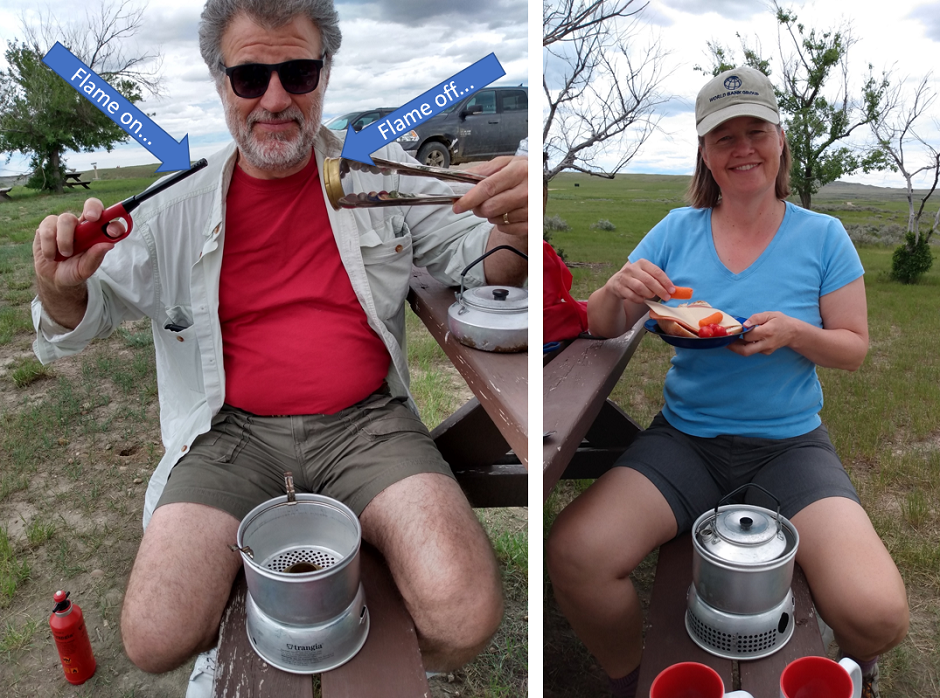
|
|||||||||||||||||||||||||||||||||||||||||||||||||||||||||||||||
|
Our drive took us past traces of history including a tipi ring, where the
nomadic tribes would use rocks to hold down the tipis, and leave these stones behind
in a ring for the next visit.
There were also remnants of old cattle corrals. |
|||||||||||||||||||||||||||||||||||||||||||||||||||||||||||||||
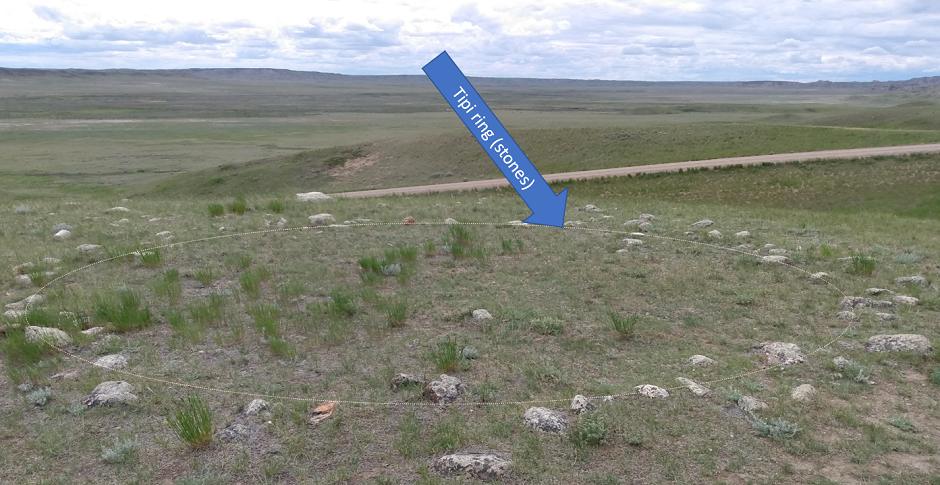

|
|||||||||||||||||||||||||||||||||||||||||||||||||||||||||||||||
| Rob took advantage of the bison back-scratching rock. Ah! That's the spot! No sign of real-life bison - only their dung and scratched-off fur. | |||||||||||||||||||||||||||||||||||||||||||||||||||||||||||||||
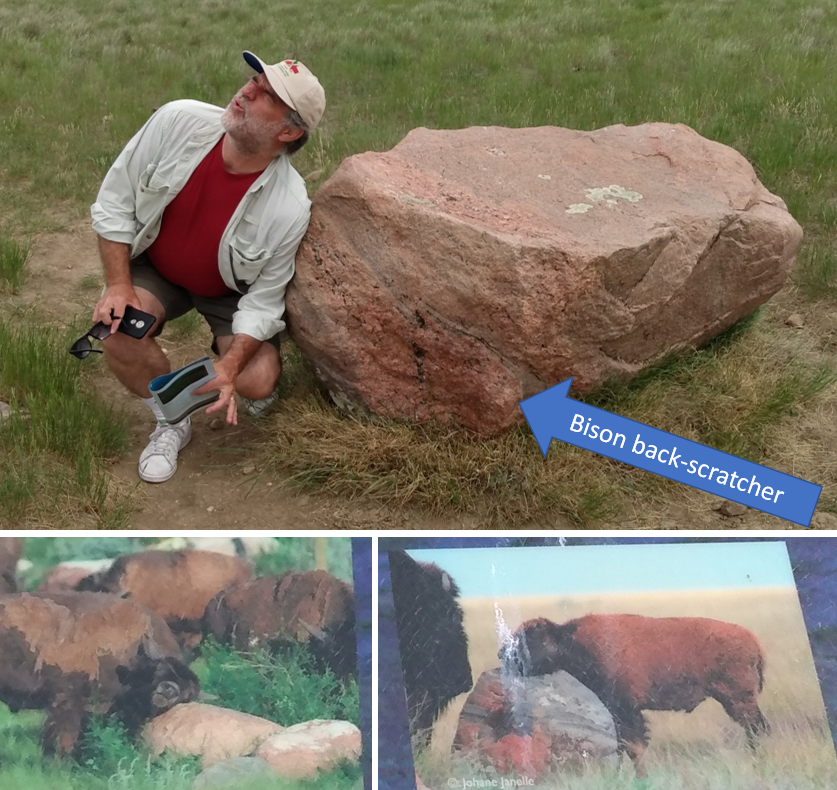
|
|||||||||||||||||||||||||||||||||||||||||||||||||||||||||||||||
|
In stead, we came across this fake bison made out of wood. It's purpose didn't become apparent
to us until the next day in the East block....
We were shocked to see a wading bird. We thought he was horribly lost here on the arrid prairies, especially since he was shrieking quite alarmingly as he darted this way and that. However, the guidebook tells us that the Long-Billed Curlew (one of Canada's rare birds) loves the grasses here and the bison watering holes. Go figure! |
|||||||||||||||||||||||||||||||||||||||||||||||||||||||||||||||
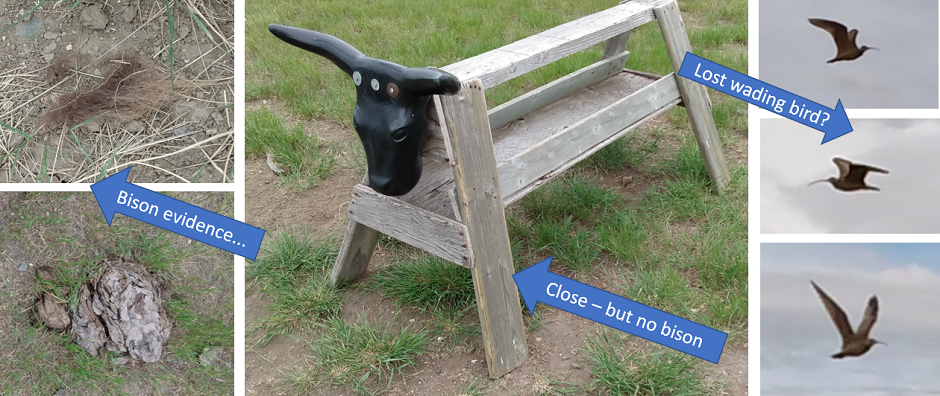
|
|||||||||||||||||||||||||||||||||||||||||||||||||||||||||||||||
| We didn't get to see the bison (at least not here - we saw some that looked like they were being ranched before we got to Swift Current), but we did get to see the black-tailed prairie dogs for which the park is famous. The West Block is the only place in Canada where the black-tailed prairie dogs exist in their natural habitat. These are very social animals and live in "dog-towns". We saw them running from burrow to burrow sniffing and grooming each other - it looked like they were kissing hello as they met! They are twice the size of the Richardson's ground squirrels (gophers) that have been driving us spare by running across roads and highways. | |||||||||||||||||||||||||||||||||||||||||||||||||||||||||||||||
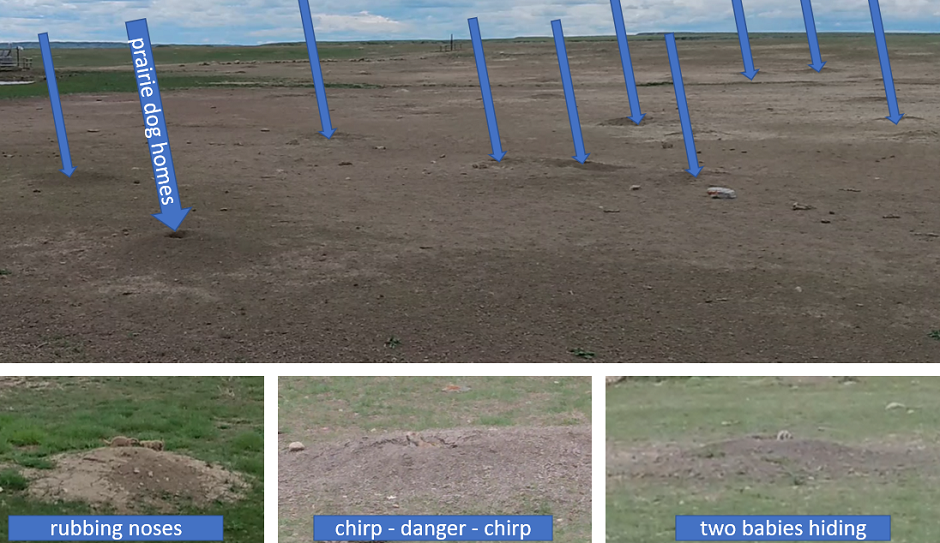
|
|||||||||||||||||||||||||||||||||||||||||||||||||||||||||||||||
|
There were also
lots and lots of ground squirrels (referred to as gophers hereabouts)
which kept popping up onto the road playing chicken with the
cars! They are really good at it even staying still when they were
between the wheels and - presumably - ducking as they were still
there after we had passed! Quite clearly, a few don't make it and
there were quite a few squished bodies on the road too - sad, but I
guess it selects for the quick ones!
They also tried to beg for food during our picnic, but we did not succumb to their cuteness! |
|||||||||||||||||||||||||||||||||||||||||||||||||||||||||||||||

|
|||||||||||||||||||||||||||||||||||||||||||||||||||||||||||||||
| It looks a pretty tough place to live up here, with water being the limiting factor. There are a few creeks which wind through the grasslands in a shallow gorge - called a coulee - which have somewhat more lush vegetation, but what is really noticeable is the complete lack of trees. Because of this, wood was hard to come by and houses were often built with sod walls and barns often dug into the wall of the coulees to support the roof. | |||||||||||||||||||||||||||||||||||||||||||||||||||||||||||||||
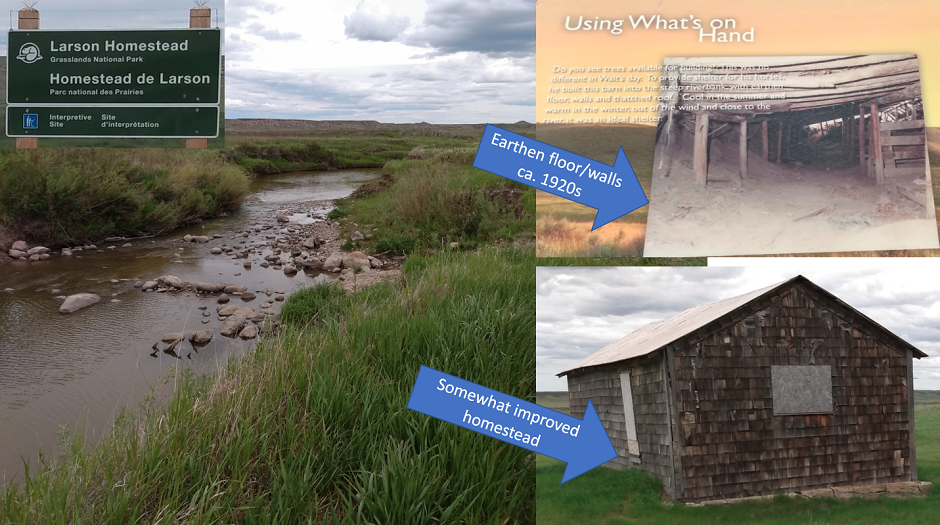
|
|||||||||||||||||||||||||||||||||||||||||||||||||||||||||||||||
| The information booklets helped us identify two of the main grass species: Blue Grama and June Grass. | |||||||||||||||||||||||||||||||||||||||||||||||||||||||||||||||
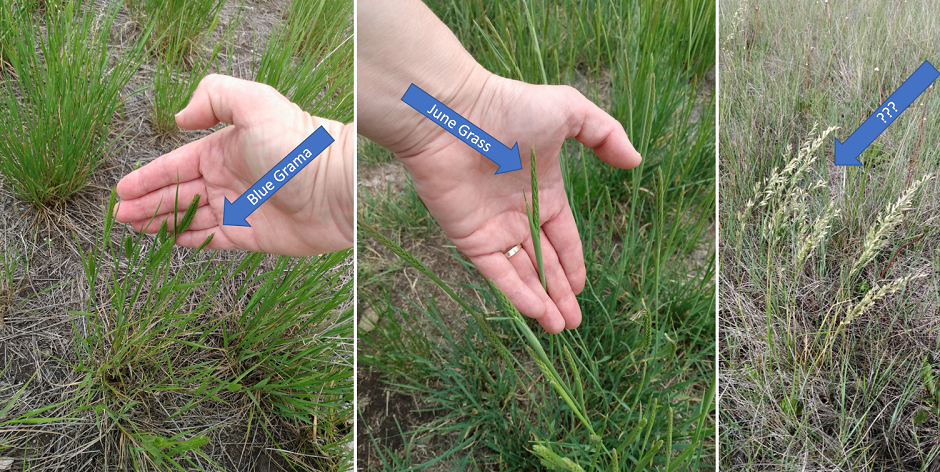
|
|||||||||||||||||||||||||||||||||||||||||||||||||||||||||||||||
|
After finishing our discovery of the West Block, it took us about 2 hours
to reach our campsite at the East Block. We had called ahead and received
careful instructions on which route to take because Google Maps and other
online route applications have been leading people astray. We followed
the campsite people's instructions and had no problems.
We arrived to find our oTENTik ready for us. So much fun! Now we have stayed in a yurt, a micro cube, and an oTENTik. It is a huge cabin/tent structure that is set up to house 6 people in bunk beds. They provided us with a shared trolly to bring all our stuff from the car. There is some electricity to run a fan and a little heater and charge some electronics. Otherwise it is a very basic campsite with no hot water and no flushing toilets. Part of the campsite is set aside for those who arrive with horses! The horses that were there were enjoying a corral and their own water supply, while their humans set up a tent and RV. Grasslands National Park is set up to be as dark as possible with little to no lights to make star gazing better. We were looking forward to trying that, so we had an early dinner (Rice-A-Roni by Rob) and an early night. |
|||||||||||||||||||||||||||||||||||||||||||||||||||||||||||||||

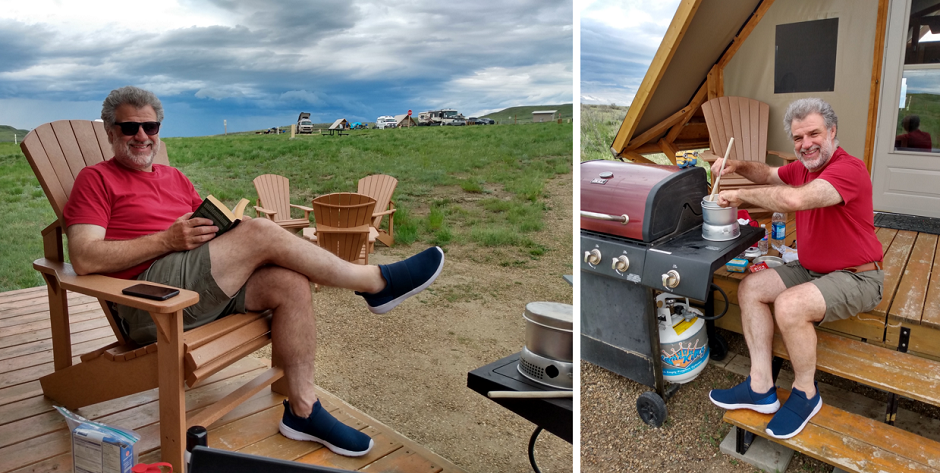
|
|||||||||||||||||||||||||||||||||||||||||||||||||||||||||||||||
| Meanwhile, neighbours were struggling to set their tent up and the rain was rolling in. Lucky as we were to have an oTENTik, Rob did go and help them so they could seek shelter in their tent and not get soaked. From our dry vantage point it was just beautiful with a very clear double-rainbow! We crossed our fingers that the constant prairie wind would blow the rain and clouds away so we could star-gaze later. | |||||||||||||||||||||||||||||||||||||||||||||||||||||||||||||||
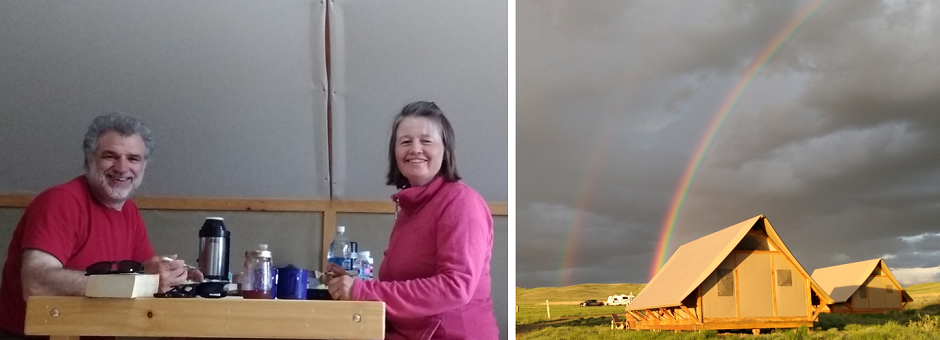
|
|||||||||||||||||||||||||||||||||||||||||||||||||||||||||||||||
|
Coming up: Exploring Grasslands National Park - East Block. | Start | Nerdy | The Largest... | Ornaments | Go To Previous Day | Go To Next Day |
|||||||||||||||||||||||||||||||||||||||||||||||||||||||||||||||
May/June 2022

